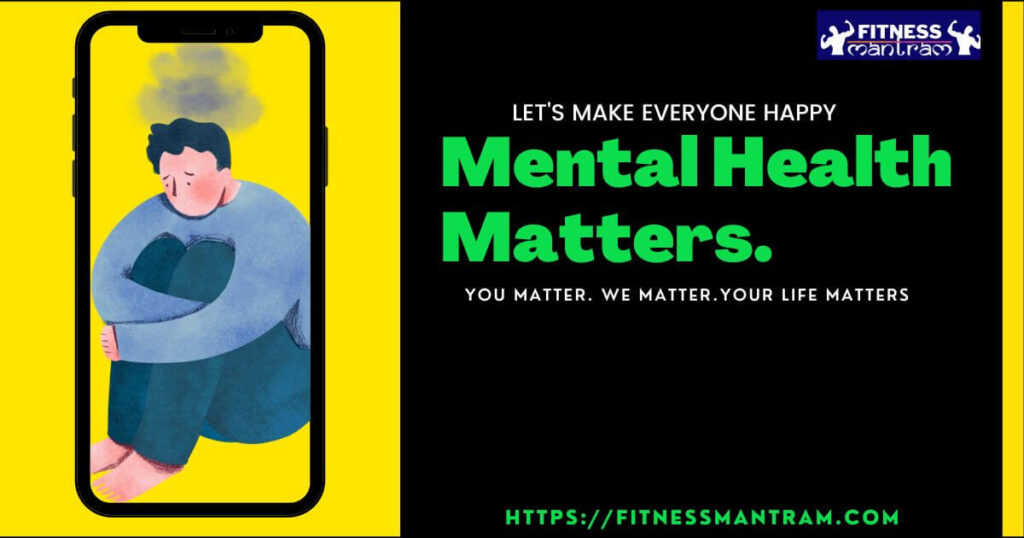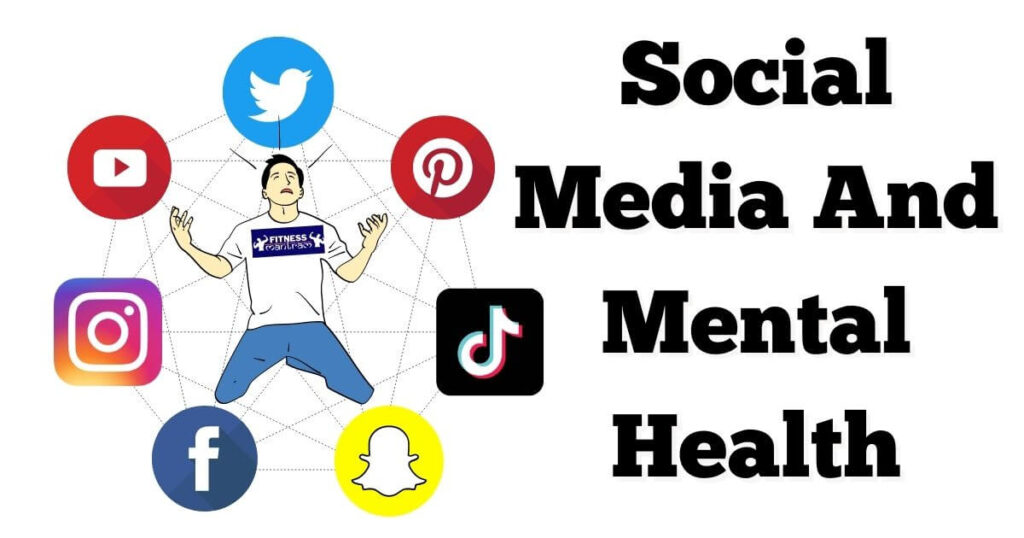Introduction:
Why Mental Health Matters ?: Mental Health is a topic that impacts us all, whether directly or indirectly. It is a crucial aspect of our overall well-being which affect every aspect of our lives, including our relationships, work, and physical health. Despite the importance of mental health, it is often overlooked or stigmatized, leading many individuals to suffer in silence. It is time to break the taboo surrounding mental health and recognize that seeking support for mental health challenges is a sign of strength and an essential step towards living a fulfilling life. In this article, we will explore the importance of mental health and the steps we can take to prioritize and support our own mental well-being and that of others.
Mental Health Matters

Mental wellbeing is a very essential and important part of our overall physical health. It’s important to take care of your mental health just as you would your physical health. This can include things like getting enough sleep, eating a healthy diet, and finding time to relax and de-stress. It’s also important to seek help if you’re struggling with mental health issues such as depression, anxiety, or stress. There are many resources available to help you, including therapy and medications. You should not feel ashamed or afraid to seek help and support from your friends and family if you are in need of it.
Mental Health Matters Meaning
A person’s overall emotional, psychological, and social well-being is referred to as their mental health. It affects our thinking, feeling, and behaviour. Further, it also affects the stress management, decision-making and interpersonal relationships. Mental health should be observe and taken seriously if anyone in our family and friends are going through mental health issues from childhood, adolescence and through adulthood
Problems with mental health are not absent from good mental health. It is the presence of positive characteristics that enable individuals to live fulfilling lives and to deal with the challenges that arise.
Having good mental health does not mean that a person will never experience mental health problems or struggles. However, it can help individuals better cope with difficult times and recover more quickly from setbacks.
Why Mental Health Is Important
Mental health is important because it affects how we think, feel, and act. It also help us to determine in which way and how well we handle stress, coordinate with others, and how we make choices with respect to the individual present situation. Good mental health is not just the absence of mental health problems, but it is also about feeling good about oneself and being able to function well in daily life. Poor mental health can lead to a range of issues, including substance abuse, relationship problems, and difficulty functioning at work or school. It is important to prioritize mental health and seek help when needed, just as we do with physical health.
Children’s Mental Health

Mental health is an important aspect of overall health and well-being for children, just as it is for adults. Children’s mental health can be affected by a variety of factors, including their environment, their relationships with others, and their own thoughts and behaviors. It’s normal for children to experience a range of emotions and behaviors, but if these emotions and behaviors are severe or prolonged, they may indicate a mental health concern. Some common signs that a child may be experiencing mental health issues include changes in mood or behavior, difficulty with relationships or school, and difficulty managing emotions. If you are concerned about a child’s mental health, it is important to seek the advice of a mental health professional, such as a child psychologist or child psychiatrist.
Social Media And Mental Health

There have been a lot of research on the impact of social media on mental health, and the results have been mixed. Some studies have found that social media can be a positive influence, helping people feel more connected and supported. Other research has found that excessive use of social media can lead to negative outcomes such as increased feelings of loneliness, anxiety, and depression.
It’s important to remember that social media is just a tool, and like any tool, it can be used in healthy or unhealthy ways. If you’re concerned about the impact of social media on your mental health, here are a few things you can try:
- Limit your usage: Try setting limits on the amount of time you spend on social media each day.
- Take breaks: Consider taking a break from social media for a few days or a week to see how it affects your mood and overall well-being.
- Use social media mindfully: Pay attention to how you feel before and after you use social media. If you find that it tends to make you feel worse, consider taking a break or using it less often.
- Seek out healthy online communities: There are many online communities focused on mental health and wellness. Consider joining one of these groups to connect with others who are also working on their mental health.
- Seek help if needed: If you’re struggling with your mental health and you’re not sure how to cope, don’t hesitate to reach out to a mental health professional for help.
Online Mental Health Counselling

Online mental health counselling, also known as teletherapy, is a type of therapy that is conducted over the internet using video conferencing or phone call. It allows individuals to receive treatment for mental health concerns from the comfort of their own home. Many people find online counselling to be a convenient and effective way to receive treatment for a variety of mental health issues, including depression, anxiety, and stress.
To find an online mental health counsellor, you can search online directories or websites that list mental health professionals who offer teletherapy services. You can also ask your primary care doctor for recommendations or contact your insurance company to see if they have a list of covered providers. It is important to choose a therapist who is licensed and experienced in providing online counselling, as the quality of care can vary.
It is also important to consider whether online counselling is the right fit for you. Some people may prefer in-person therapy, while others may find that online counselling is more convenient or better suited to their needs. It is always a good idea to speak with a mental health professional to determine the best course of treatment for your specific needs and concerns.
Mental Health Therapy
Mental health therapy is a form of treatment that involves talking with a mental health professional to explore your thoughts, feelings, and behaviours, and work towards improving your mental health. Therapy can help you learn coping skills, reduce symptoms of mental health conditions, and improve your overall quality of life. There are many different types of therapy, including cognitive-behavioural therapy, dialectical behaviour therapy, and psychoanalytic therapy, among others. It’s important to find a therapist who is trained in the specific type of therapy that you feel would be most helpful for you.
Learn More about Neuro-Balance Therapy
Mental Health Treatment
Mental health treatment can take many forms and can be tailored to an individual’s specific needs. Some common forms of treatment include therapy (such as cognitive-behavioural therapy or talk therapy), medication (such as antidepressants or antipsychotics), or a combination of both. It’s important to work with a mental health professional, such as a psychologist or psychiatrist, to determine the best course of treatment. Other options for mental health treatment may include self-care practices such as exercise, getting enough sleep, and engaging in activities that bring joy and relaxation. It’s also important to have a support system of friends and family to lean on during treatment
How To Improve Mental Health
There are many ways to improve mental health, and what works for one person may not work for another. Given below few tips which you can try yourself to get rid of your mental health:
- Take care of your physical health: Exercise regularly, eat a healthy diet, and get enough sleep. These things can all help improve your mental health.
- Practice mindfulness: Try to pay attention to the present moment, rather than dwelling on the past or worrying about the future. Mindfulness Meditation will help you to feel more relaxed and focused.
- Always remain in touch with family and friends: Call your nearest and dearest loved ones, spend time with them or consider joining a mental health help support group. Having strong social connections can help improve your mental health.
- Seek professional help: If you’re struggling with your mental health, consider speaking with a mental health professional. They can provide you with the support and treatment you need to feel better.
- Take breaks and practice self-care: Make sure to take breaks and do things that you enjoy and that help you relax. This can help you manage stress and improve your mental health.
Remember that improving your mental health is a process, and it may take time. Try to remain calm relaxed and be patient with yourself and even try different practise for the betterment of yourself until when you find what and which one better works for you.
Mental Health Quotes : https://youtu.be/tvwS4pP-Pg8
Mental Health Awareness Day : World Mental Health Day
Mental Health Awareness Day is an annual event that is observed on October 10th each year. The purpose of Mental Health Awareness Day is to raise awareness about mental health issues and to reduce the stigma associated with seeking help for mental health problems. This day is an opportunity for individuals to educate themselves about mental health, to share their experiences with others, and to support those who are struggling with mental health issues. Many organizations and communities hold events and activities to mark Mental Health Awareness Day, including educational seminars, support groups, and fundraisers.
Learn More about Brain Health among people over 40
Conclusion
Mental health is a critical issue that affects individuals, families, and communities around the world. It is important to recognize that mental health is just as important as physical health and should be treated with the same level of care and attention. There are many effective treatments and resources available to support individuals with mental health challenges and it is important to reach out for help if needed. By prioritizing mental health and supporting those in need, we can create a healthier and thriving society.
Frequently Asked Question
When Is Men’s Mental Health Month?
Mental Health Month is observed in the United States in May. It is a time to raise awareness about mental health, share resources and support those who are struggling with mental health issues. The focus is on all individuals, including men.
The Common Signs & Symptoms of Stress Which Affect Mental Health?
There are many potential signs of stress affecting mental health. Some common ones include:
- Changes done in sleeping patterns or having trouble in falling asleep
- Changes in appetite or eating habits
- moodiness, depression, or hopelessness
- Difficulty concentrating or making decisions
- Increased irritability or anger
- Feelings of anxiety or panic
- Loss of interest in your previously most enjoyable activities
- Increased use of alcohol or other substances as a coping mechanism
- Some common physical symptoms like headaches, stomach problems and fatigue
If anyone nearby in you friends and family person are experiencing any of these signs, it is very important for you to reach out to get help and support from mental health support team members. Stress can have a serious impact on mental health and it is important to address it as soon as possible.
How To Get Mental Health Help?
There are many ways to get mental health help. Here are a few options:
- Talk to a primary care doctor or a mental health professional, such as a therapist or psychologist. They can provide a referral to a mental health specialist or recommend treatment options.
- Contact a mental health hotline or helpline. These services are available 24/7 and can provide support and guidance.
- Reach out to a support group. Sharing your experiences and connecting with others who have similar struggles can be helpful.
- Use online resources, such as mental health apps or websites that offer self-help tools and support.
- Consider trying self-care techniques, such as exercising, meditating, or spending time in nature, which can help improve your mental well-being.
- It’s important to remember that seeking help is a sign of strength, and it’s okay to ask for support when you need it.
How To Take Care Of Your Mental Health?
There are several ways of taking care of mental health. You can try the following:
- Practice self-care: Take time to do things that you enjoy and that help you relax. This could include activities like exercising, meditating, or spending time in nature.
- Keep a healthy lifestyle: Eat a healthy diet, get enough sleep, and try to avoid substances like alcohol and tobacco that can affect your mental health.
- Get in touch with friends and family: It is very essential that you should surround yourself with supportive people like your family and friends who care about you. Consider joining a support group or seeking therapy to talk about your feelings.
- Learn to manage stress: Try stress-reduction techniques such as deep breathing, progressive muscle relaxation, or mindfulness meditation.
- Seek professional help: If you are struggling with your mental health and are unable to manage it on your own, don’t be afraid to seek help from a mental health professional. They can provide you with the support and treatment you need to feel better.
Remember, it’s important to be kind to yourself and seek help if you need it. Mental health is as important as physical health
How To Journal For Mental Health ?
Journaling can be a very effective tool for improving your mental health. It can help you process your thoughts and feelings, gain clarity and perspective, and identify patterns in your behaviour and thinking. Here are a few tips for how to get started:
- Choose a journal and writing implement that you like. You want the process of writing to be enjoyable, so pick something that you will look forward to using.
- Set aside time each day to write. It doesn’t have to be a long time – even just 10-15 minutes can be beneficial. Choose a time that works best for you, whether that’s first thing in the morning, during your lunch break, or before you go to bed at night.
- Write freely. Don’t worry about grammar or spelling – just let your thoughts and feelings flow onto the page. You can write about anything that’s on your mind, whether it’s something that’s been bothering you, something you’re grateful for, or a goal you’re working towards.
- Be consistent. Try to journal every day, or at least several times a week. This will help you build the habit and get the most benefit from the practice.
- Reflect on what you’ve written. After you’ve finished writing, take a few minutes to read back over what you’ve written. What patterns or themes do you notice? What emotions are coming up for you? What can you learn about yourself from your writing?
Remember, journaling is a personal practice, and there is no right or wrong way to do it. The important thing is to find a method that works for you and to be consistent in your writing.
Read More :
- Men’s mental health month
- The Growing Epidemic of Obesity
- Neck Fat: How To Get Rid Of Neck Fat
- The Top 10 Myths about Weight Loss
- The Myths About Vitamins and Supplements
Disclaimer: The details & information given here in this article is based on information as available on other published site on internet. Do take medical advice before adopting it. Fitness Mantram Does Not Confirm It. This site contains affiliate links. If you choose to make a purchase after clicking a link the author/owner/creator may receive a commission at no ADDITIONAL cost to you. Thank you for your support!

2 thoughts on “Mental Health Matters: Why Mental Health Is Important?”